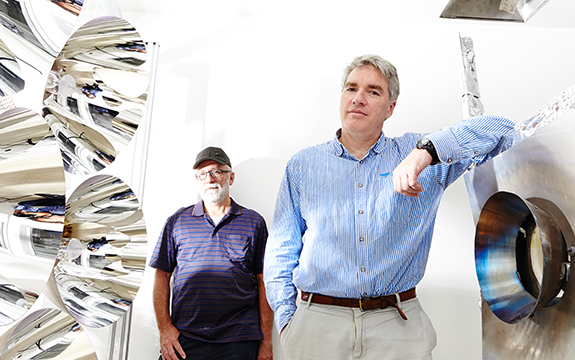Space junk is dangerous, but it’s also an opportunity

Post-doc researcher Ben Ekman (left) and Professor Geoff Brooks (right) in the research lab
In summary
- Swinburne researchers are exploring recycling on the moon
- About 200,000kg of man-made materials rest on the lunar surface
- It would save billions of dollars and rid space of hundreds, maybe even thousands, of tons of space junk if we could recycle space debris on the moon or in orbit
Space experts estimate there are over 100 million pieces or around 8,000 tons of space debris orbiting around us, mostly consisting of satellite and rocket scraps. And not all space debris is flying around in orbit.
It is estimated that about 200,000kg of space junk rests on the lunar surface and this amount will increase with the future missions.

Swinburne researchers are investigating the technology best suited to recycling on the moon’s surface. Image credit: NASA
According to the German Start-up, Orbit Recycling, more than 150 tons of aluminium alone can be regained and recycled on the moon. This would save billions of dollars; Orbit Recycling calculated the total cost of recycled aluminium on the moon to be 150,000 euro/kg, which is a fraction of the transported material cost from the earth.
A Swinburne research group led by Professor Geoffrey Brooks, Associate Professor Boris Eisenbart and Professor Alan Duffy is focused on the recycling metals on the lunar surface, working with researchers from India, China and USA on some of the challenges of mining on the moon.
Their current work looks at the furnace technology best suited to recycling on the moon. They are looking at concentrated solar energy as a source of heat, and they have been making ceramics and metals using concentrated solar energy and regolith-like materials found on the surface of the earth to address this question.
This forms part of the Swinburne Space Technology and Industry Institute’s research interest in extraterrestrial resource processing.
Lunar recycling represents a significant challenge but is a critical issue to address. All major space organisations around the world are planning lunar missions. Now is the time to think responsibly what we leave behind in our future lunar missions, especially if we want to develop sustainable human presence on the moon.
-
Media Enquiries
Related articles
-

- Astronomy
- Science
Swinburne appoints new Director of Innovative Planet Research Institute
Leading geodesy expert, Professor Allison Kealy, has been appointed as the inaugural Director of Swinburne University's Innovative Planet Research Institute.
Monday 22 April 2024 -

- Astronomy
‘Beyond what’s possible’: new JWST observations unearth mysterious ancient galaxies
A paper published in Nature details findings using new data from the James Webb Space Telescope challenges our understanding of how galaxies form.
Thursday 15 February 2024 -

- Science
Quantum research sheds light on the mystery of high-temperature superconductivity
An international team of scientists have made a new discovery that may help to unlock the microscopic mystery of high-temperature superconductivity and address the world’s energy problems.
Thursday 08 February 2024 -

- Technology
- Science
- Sustainability
- Engineering
CSIRO and Swinburne invest in green steel and mineral processing to help industry get to net zero
CSIRO and Swinburne have established a new partnership to tackle global decarbonisation with innovative green steel and mineral processing research and development.
Thursday 01 February 2024 -

- Technology
- University
Innovative approaches to teaching and learning funded by Adobe
A total of 10 diverse projects dedicated to improving the digital literacy of our students have been awarded Adobe Innovation Grants and Curriculum Innovation Program.
Wednesday 31 January 2024

